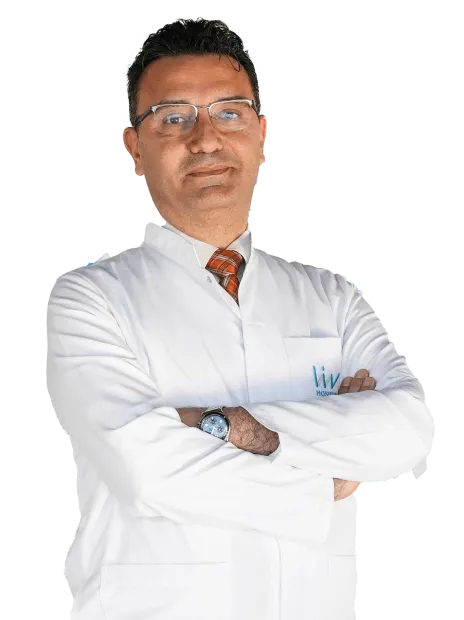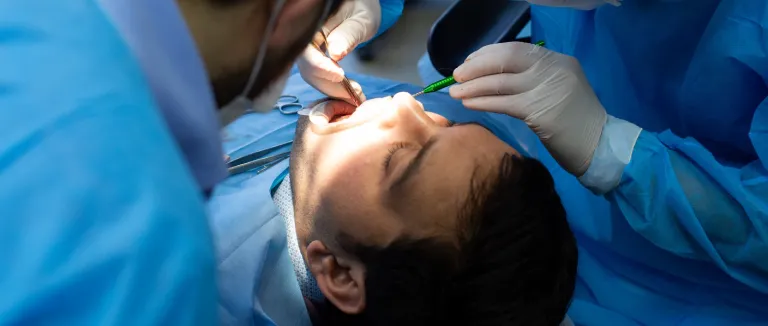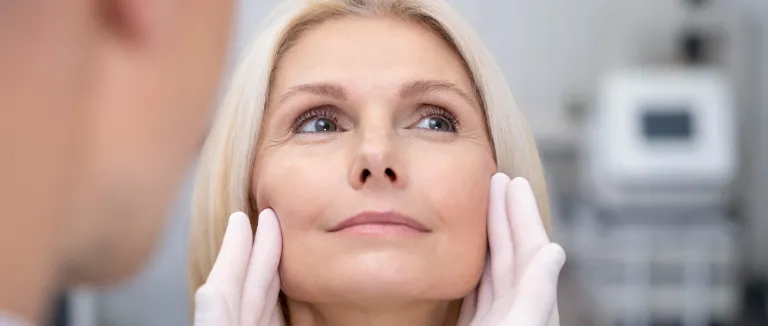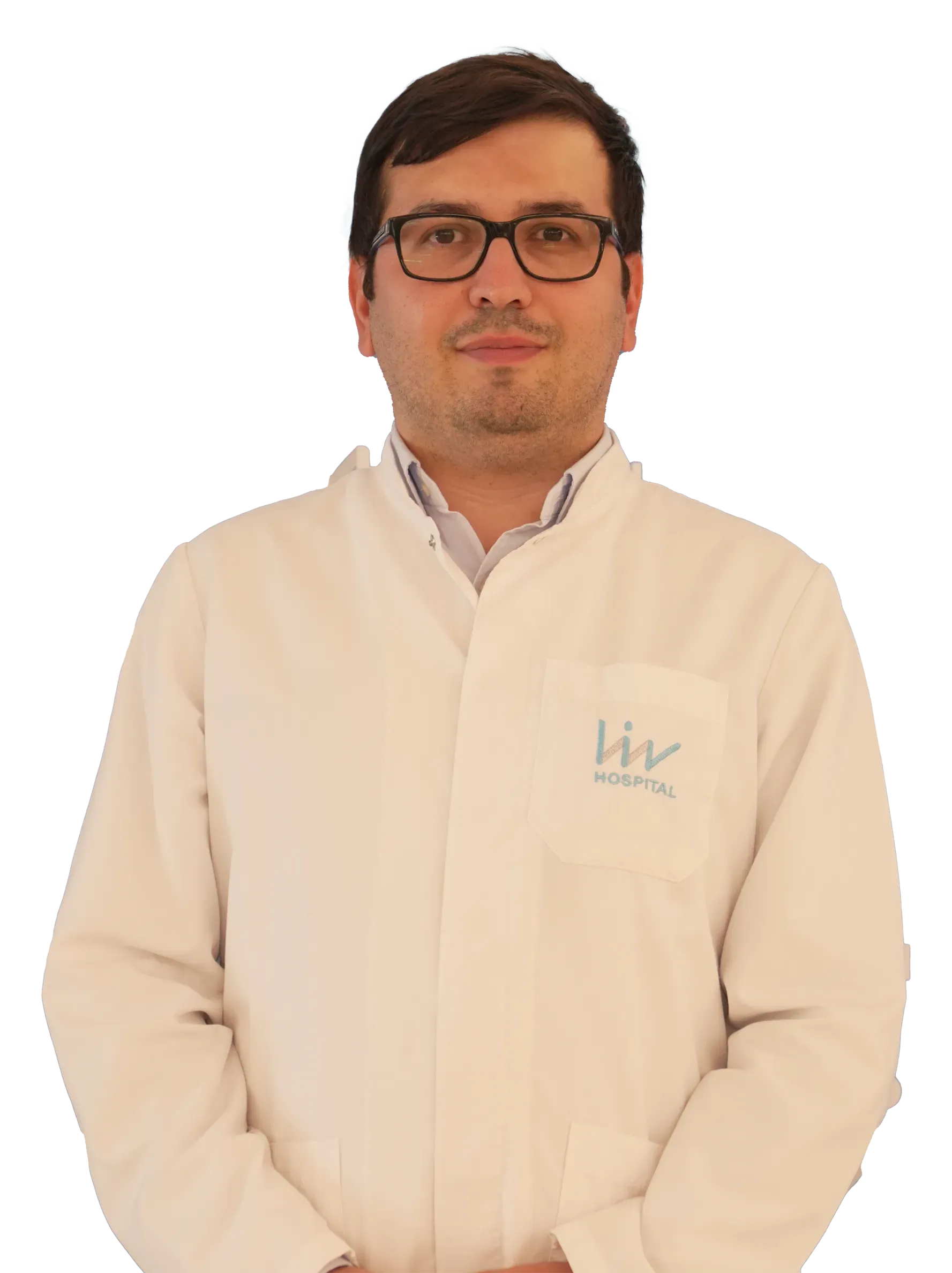What Is A Maxillofacial Surgery? Maxillofacial In Istanbul

-
What Is Maxillofacial?
-
What Is A Maxillofacial Surgeon?
-
Difference Between Maxillofacial Surgery Oral And Maxillofacial Surgery
-
Maxillofacial Surgery Procedure
-
Maxillofacial Surgery Recovery
-
Liv Hospital For Maxillofacial Surgeries
Maxillofacial surgery is a specialized field that orchestrates revolutionary transformations, not only in appearances but in lives. It is a compelling fusion of medical skill and aesthetic accuracy. Maxillofacial surgery is a ray of hope and innovation for treating face abnormalities, restoring function, and improving appearance. In this blog, you can demystify the complexities of this procedure with more information.

What Is Maxillofacial?
The term "maxillofacial" describes the region of the jaw and face. A specialized area of surgery, which is called oral and maxillofacial surgery, focuses on treating diseases and wounds affecting the head, face, jaw, and mouth. Congenital malformations, severe injuries, illnesses, infections, and even cosmetic concerns of the face and oral tissues are just a few of the challenges this specialty addresses by combining medical and dental knowledge.
What Is A Maxillofacial Surgeon?
Professionals with extensive training in sophisticated surgical operations involving the bones, muscles, and soft tissues of the face and jaw are known as maxillofacial surgeons. They collaborate closely with other doctors and dentists to offer complete care to patients needing treatments like orthognathic (jaw) surgery, facial trauma reconstruction, cleft lip and palate repair, dental implant placement, corrective jaw surgery, and various procedures to enhance facial aesthetics.
Difference Between Maxillofacial Surgery Oral And Maxillofacial Surgery
There is a small difference between maxillofacial surgery and oral maxillofacial surgery, despite the fact that the phrases are sometimes used interchangeably:
Maxillofacial Surgery
More broadly referred to as "maxillofacial surgery," this phrase refers to operations on the entire face, including the jaws, cheekbones, nose, and forehead. Congenital abnormalities, severe injuries, infections, tumors, and other disorders affecting the facial bones and soft tissues may be treated during maxillofacial surgery. Additionally, it could entail treatments like facelifts or rhinoplasty to improve facial looks.
Maxillofacial Oral Surgery
Surgical operations involving the mouth (oral) and the whole face (maxillofacial) are the focus of maxillofacial surgery, oral and maxillofacial surgeons. Numerous disorders affecting the mouth, jaws, and face are among the conditions that are diagnosed and treated. Maxillofacial oral surgeries may entail techniques including wisdom tooth removal, dental implant insertion, orthognathic surgery (corrective jaw surgery), correction of cleft lips and palates, rebuilding following facial damage, and administering antibiotics for oral and face infections.
You can contact our Liv Hospital experts in Istanbul to know more!
Maxillofacial Surgery Procedure
Here are a few typical processes:
- Third Molar Extraction: Third molar extraction is another name for removing impacted or troublesome wisdom teeth that may be painful, infectious, or damaging to nearby teeth.
- Dental Implant Surgery: Dental implants serve as a replacement for missing teeth. In this surgical operation, a titanium implant supporting a dental prosthesis or replacement tooth is placed in the jawbone.
- Orthognathic Surgery: This technique adjusts jaw and facial bone irregularities that may affect the alignment of the bite, speech, and facial appearance. The alignment of the upper and lower jaws improves both function and aesthetics.
- Cleft Lip and Palate Repair: To treat congenital malformations like cleft lips and palates, which damage the lip and palate, surgeons carry out reconstructive treatments.
- Facial Trauma Reconstruction: Surgeons reconstruct the soft tissues and bones of the face following accidents or injuries that cause facial fractures to restore both function and appearance.
- Temporomandibular Joint (TMJ) Surgery: Surgical procedures can be carried out to treat TMJ diseases that result in jaw pain, clicking, or restricted movement.
- Facial Aesthetic Surgery: When it involves the facial tissues, procedures like rhinoplasty (nose surgery), facelifts, eyelid surgeries, and chin augmentation fall under the category of maxillofacial surgery.
- Oral Pathology Surgery: Common treatments in this discipline include the removal of oral tumors, lesions, and cysts, as well as biopsies to identify mouth illnesses.
- Surgery For Sleep Apnea: By correcting anatomical conditions that lead to airway obstructions while you sleep, surgical procedures can help with obstructive sleep apnea.
- Reconstructive Surgery: Maxillofacial surgeons can carry out complex reconstructive treatments to restore facial features and functions following the excision of cancer, trauma, or congenital abnormalities.
- Salivary Gland Surgery: Surgery to treat infections, remove tumors, or remove stones from the salivary glands is known as salivary gland surgery.
To know more about the surgery procedure in Turkey, you can contact the medical staff at Liv Hospital Istanbul!
Maxillofacial Surgery Recovery
Here are some general recommendations for recovering from maxillofacial surgery:
- Pain Management: After surgery, pain and discomfort are frequent. Your surgeon will likely recommend medicines to help with pain control during the initial healing phase.
- Ice Packs: You might need to stick to a soft or liquid diet for a while following surgery to aid in the healing of your surgical sites. During the first 48 hours, ice packs on the injured area can assist in minimizing swelling.
- Diet: It's crucial to practice good oral hygiene to stay healthy and recover more quickly. Avoiding chewy, crunchy, or hard meals can reduce the strain on the healing tissues.
- Oral Hygiene: Maintaining good oral hygiene is essential to prevent illness and speed recovery. Your physician will explain how to maintain your surgery areas clean without interfering with the healing process.
- Activity Restrictions: You might need to avoid physically strenuous tasks for a while following the treatment, depending on the technique. When you can gradually return to normal activities will be determined by your surgeon.
- Follow-Up Appointments: It's critical to attend all scheduled follow-up consultations with your surgeon. During these appointments, your surgeon can keep track of your development, take out any stitches if necessary, and handle any issues.
- Medication: If antibiotics have been recommended, follow the directions carefully to avoid infection. Any additional drugs you must take during your recovery should follow your surgeon's instructions.
- Rest And Recovery: Healing requires enough sleep. Get lots of rest during the first several days after surgery, and stay away from anything that could irritate the surgical site.
- Avoid Alcohol And Tobacco: If you smoke or use tobacco products, stop doing so while you're improving because these substances can hinder recovery. Avoid drinking alcohol because it can also delay recovery and interfere with prescriptions.
- Observe Dietary Recommendations: If you're on a limited diet, abide by your doctor's instructions for resuming solid foods gradually as your recovery advances.
Look for signs of infection, such as escalating discomfort, swelling, redness, or discharge from the surgery site. If you are experiencing any symptoms, medical experts at Liv Hospital in Istanbul are just a call away!
Liv Hospital For Maxillofacial Surgeries
For your maxillofacial surgery in Turkey, pick Liv Hospital. Liv Hospital, a network of 7 hospitals, exemplifies "Leading International Vision," prioritizing international healthcare quality and imagining a future of comprehensive patient care. You can contact Liv Hospital medical experts to learn about the maxillofacial surgery treatment prices in Turkey 2023!
Frequently Asked Questions
Maxillofacial surgeons treat a wide range of conditions affecting the mouth, jaws, and face. This includes correcting structural jaw deformities (orthognathic surgery), treating facial trauma, performing complex tooth extractions, placing dental implants, and managing oral cancers or TMJ (jaw joint) disorders.
The initial recovery for most maxillofacial procedures takes about 1 to 2 weeks, during which swelling and bruising are common. However, full bone healing typically takes 6 to 12 weeks. Most patients can return to work or school within 10 days, provided they follow a soft-food diet as prescribed by their surgeon.
Yes, most major maxillofacial procedures, such as jaw realignment or facial trauma repair, are performed under general anesthesia in a hospital or specialized surgical center. For minor procedures like complex wisdom tooth removals, intravenous (IV) sedation or local anesthesia may be used to ensure patient comfort.
* Contents of this page is for informational purposes only. Please consult your doctor for diagnosis and treatment. The content of this page does not include information on medicinal health care at Liv Hospital







